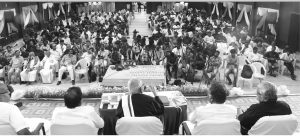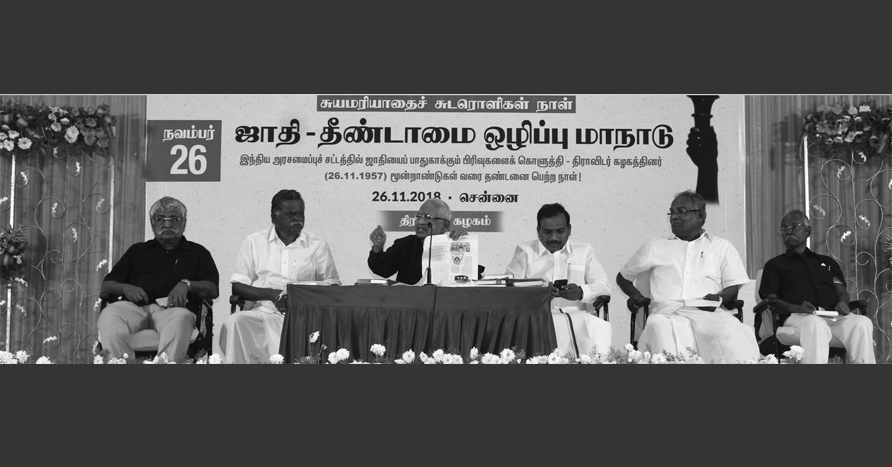Dr. K. Veeramani delivers the presidential address
Indian Constitution was adopted on 26th November 1949 and came for implementation with effect from 26th January 1950. The preamble of the Constitution commences ‘We the people of India, solemnly resolve to constitute India into a Sovereign, Socialist, Secular, Democratic, Republic………..’ Indian Constitution ensures fundamental rights to the citizens besides showing the direction desired for further improvement. Besides, there are certain inadequacies noticed in it owing to the influence of oppressive forces which were part of the Constituent Assembly. The Constitution ensures equality but is not against the caste system which discriminates, and divides the people of the country in graded inequalities. There are many provisions which supports the prevalence and continuance of the caste system. One such inadequacy was available in the form of Article 17 that says, Untouchability is abolished and its practice in any form is forbidden The enforcement of any disability arising out of Untouchability shall be an offence punishable in accordance with law.
The social revolutionary Periyar E.V.Ramasamy fought against caste system even in the British India. Even after independence the country adopted a Constitution that refer and supports caste system. Caste system is a menace for the toiling masses who are identified as Sudras as per varnashrma which continues to remain as an insult through the provisions of Indian Constitution. In 1957 Periyar appealed to the authority for the removal of the provisions that support the caste system and fixed a deadline for it. The appeal was not considered by the authority. Periyar called for an agitation to burn the Constitution on 26th November as a symbol of protest. A special legislation was made by the Centre on the mode of punishing the people who burn the Constitution. A massive agitation took place burning the Indian Constitution throughout the Madras Province, presently Tamil Nadu. Unmindful of the gravity of the punishment, nearly 10,000 Black Shirt cadres of Dravidar Kazhagam participated in the agitation at various places. About 3000 cadres were arrested, prosecuted and awarded with punishment of imprisonment ranging from 3 months to 3 years. The Black Shirt cadres happily accepted the punishment and underwent imprisonment. Few of the cadres died in the prison itself and a few more also passed away after the release due to their sufferings in prison.
Still the sacrifices made by them have not yielded to so far. As an honour to the Black Shirt cadres who had sacrificed their life the day November 26 is being commemorated as ‘Self Respect Martyrs’ Day.’

The massive audience, turned on the Day
On 26th November 2018, Dravidar Kazhagam observed Self Respect Martyrs’ Day as ‘Caste, Untouchability Annihilation Day’ at Periyar Thidal, Chennai. Dr. K. Veeramani, President, Dravidar Kazhagam presided over the meet. A. Raja former Union Minister and Propaganda Secretary, Dravida Munnetra Kazhagam, K. Balakrishnan, State Secretary, Tamil Nadu CPI (Marxist), R. Mutharasan, State Secretary, Tamil Nadu CPI, Prof. Suba. Veerapandian, Dravidian Tamil Federation, were the speakers.
Excerpts from the speech of Dr. K. Veeramani:
Periyar asked me in how many places does the word caste (jati) occur in the Constitution.
I said “In eighteen places.”
Immediately Periyar said, “If the phrase in the Constitution, ‘untouchability is abolished’ is replaced with the phrase ‘caste is abolished’; whatever form caste takes, chest thread cannot be worn and the symbol of caste cannot be displayed. And nobody can boast of his caste.”
I got a doubt. “As far as reservation is concerned, we are demanding it on caste basis. Only caste is the yardstick for measuring educational backwardness and social backwardness. Without caste how to measure backwardness?”
Periyar gave a clear cut reply to my question. “We do not demand that reservation should continue till the end of the world. It is required only till equality is established.
Secondly, though the Constitution asserts that ‘untouchability is abolished’, it has allowed them concession since the scheduled castes and the scheduled tribes remain backward. In the way, a note can be added that for a certain number of years reservation will continue for backward classes. What is the big problem here?”
Periyar Movement sustains the pride for its progressive ideology, which has been aptly proved through the burning of Indian Constitution as a symbol of protest, revolting against the insult caused to them through the provisions of the Indian Constitution by protecting the caste system.





